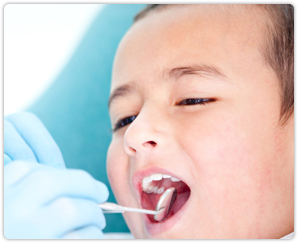Pediatric Dentistry

What is a Pediatric Dentistry?
Pediatric dentists are dedicated to the oral health of children from infancy through the teen years. They have the experience and qualifications to care for a child's teeth, gums, and mouth throughout the various stages of childhood.
Children begin to get their baby teeth during the first 6 months of life. By age 6 or 7 years, they start to lose their first set of teeth, which eventually are replaced by secondary, permanent teeth. Without proper dental care, children face possible oral decay and disease that can cause a lifetime of pain and complications.
When should a child first visit the dentist?
The child should be brought to the dentist when he turns 1 year old .By that time the first teeth comes and the dentist can discuss ways of keeping oral hygiene. A dentist can guide the parents about diet, tooth eruption, finger habits, fluoride etc.
How many visits are recommended?
The child should be brought twice a year to the dental clinic .The visits may vary if the child has tooth decay, bad oral hygiene, and unusual teeth growth.
How important are baby teeth?
They help the child to crew food, smile properly and speak clearly. Baby teeth hold the space for permanent teeth. If child looses teeth at an early age because of decay/ damage the nearby teeth can encroach that free space which can result in misplaced/crooked permanent teeth.
What Types of Treatments Do Pediatric Dentists Provide?
Pediatric dentists provide comprehensive oral health care that includes the following:
- Infant oral health exams, which include risk assessment for caries in mother and child
- Preventive dental care including cleaning and fluoride treatments, as well as nutrition and diet recommendations
- Habit counseling (for example, pacifier use and thumb sucking)
- Early assessment and treatment for straightening teeth and correcting an improper bite (orthodontics)
- Repair of tooth cavities or defects
- Diagnosis of oral conditions associated with diseases such as diabetes, congenital heart defect, asthma, hay fever, and attention deficit/ hyperactivity disorder
- Management of gum diseases and conditions including ulcers, short frenulae, mucoceles, and pediatric periodontal disease
- Care for dental injuries (for example, fractured, displaced, or knocked-out teeth)




